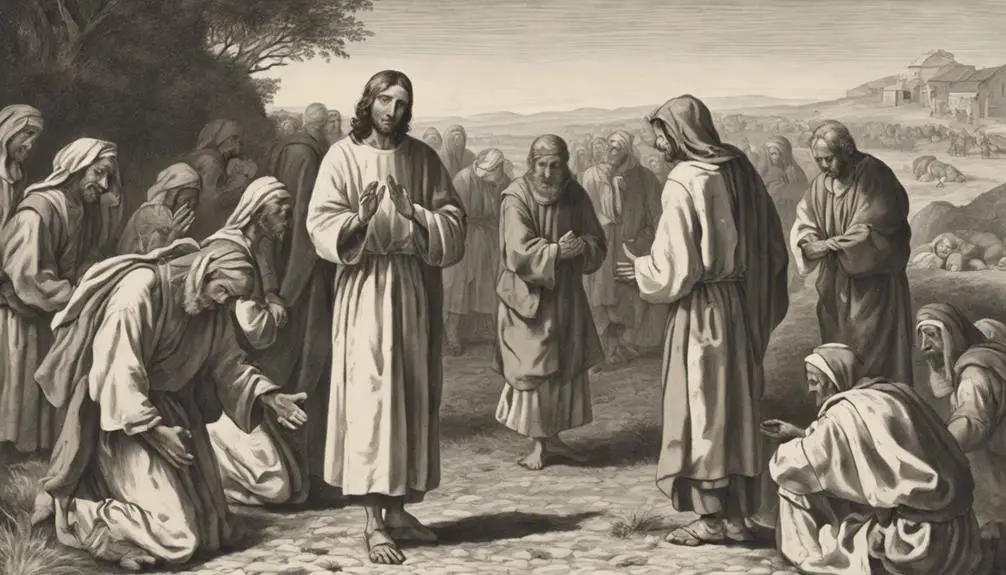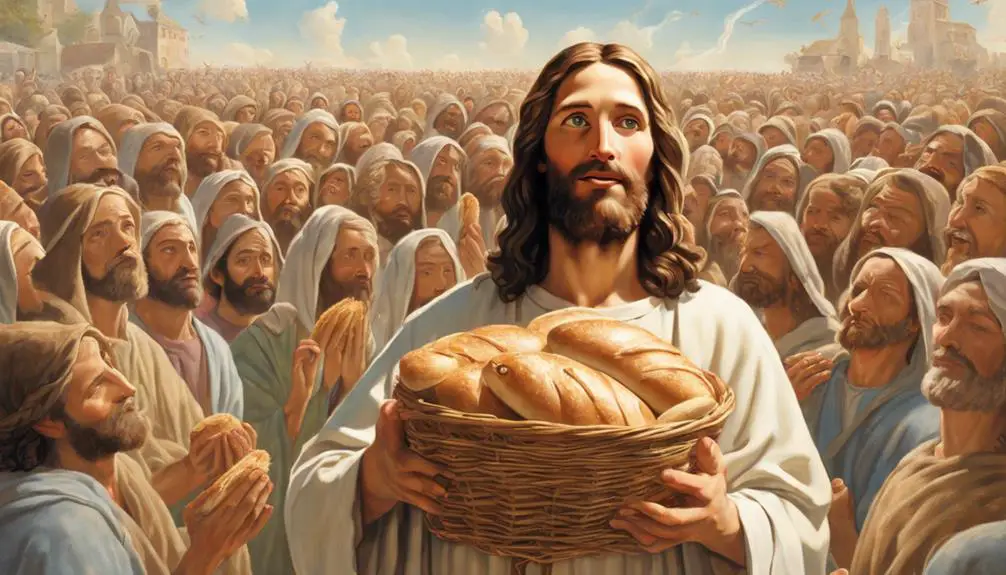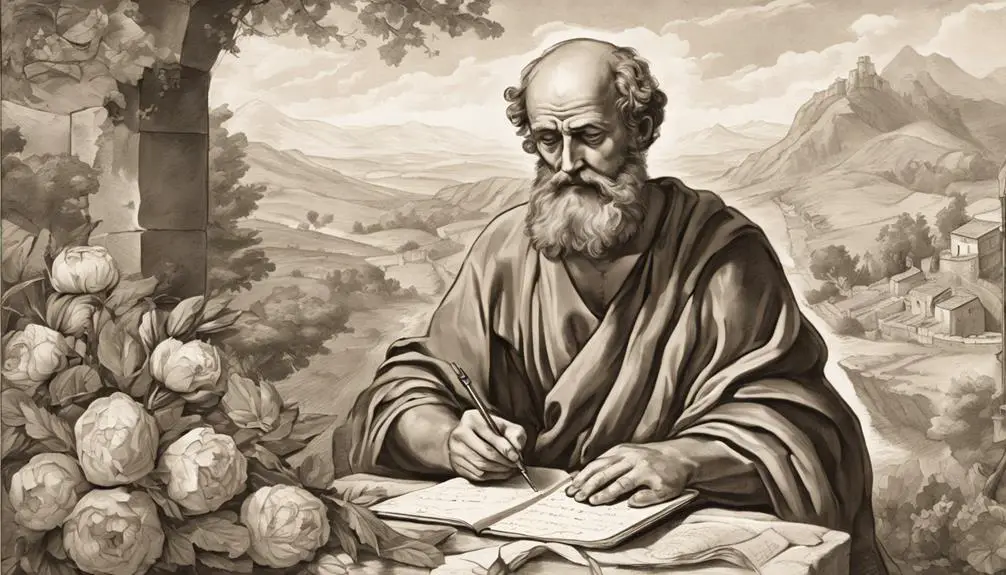Find timeless lessons on gratitude in the Bible's tales of thankfulness, and question where you stand in your own expressions of gratitude.

Stories in the Bible About Being Thankful
Like a treasure hunter unraveling the secrets of an ancient map, you might find the stories of gratitude in the Bible deeply enriching. They're not just tales, but timeless lessons on thankfulness that still resonate today.
Consider, for example, the Ten Lepers who, healed by Jesus, only one returned to express his gratitude. Or David's song of Thanksgiving, an ode to God's perpetual mercy. These narratives provide a compelling exploration of gratitude's spiritual significance.
But what do they suggest about our own expressions of thankfulness? Are we, like the one leper, in the minority?
Key Takeaways
- Biblical stories underline the transformative power of gratitude, exemplified in figures like the healed leper and Hannah.
- Miraculous events like feeding the five thousand highlight the link between gratitude, faith, and God's bountiful provision.
- Despite adversity, figures like Apostle Paul demonstrate unwavering thankfulness, emphasizing the importance of gratitude in all circumstances.
- The Bible teaches that gratitude is not just a feeling but an action, crucially tied to recognizing God's role in our lives.
The Ten Lepers' Gratitude

In the account of the ten lepers, found in Luke 17:11-19, you'll discover a powerful lesson about gratitude, showing how out of ten men healed by Jesus, only one returned to express his thanks. This tale of leprosy healing is a stark example of human nature's tendency to overlook the expression of gratitude.
Analyzing the narrative closely, you'll notice the lepers' desperate plea for mercy and healing. It's important to understand that leprosy, a severe skin disease, rendered them social outcasts. So, their healing wasn't just physical, but also socio-emotional, restoring their societal status.
Yet, despite the magnitude of this healing, only one recognized the source of his blessing and returned to thank Jesus. It's intriguing to observe the contrast between the ten who received the same miracle, but only one demonstrated an expression of gratitude.
This story isn't merely a historical account; it's an allegory for today. It challenges you to reflect on your own expression of gratitude. Are you like the one, or the nine? Remember, gratitude isn't just a reaction; it's an action. It's not just about feeling thankful but expressing it. This tale underscores the importance of gratitude expression in your life.
David's Song of Thanksgiving

Shifting our focus to another biblical tale of gratitude, let's explore David's Song of Thanksgiving, a narrative filled with heartfelt appreciation and profound reverence for God's deliverance. It's a story that wonderfully showcases David's humility and royal gratitude.
In this song, David, the King of Israel, doesn't just express gratitude. He also acknowledges God's sovereignty, power, and compassion. His humility is evident as he gives all credit to God for his victories and successes, never taking any for himself.
As you learn about David's Song of Thanksgiving, consider this table which provides a deeper understanding:
Verse |
Content |
Interpretation |
|---|---|---|
2 Samuel 22:47 |
"The Lord lives, and blessed be my rock…" |
David's acknowledgement of God's power |
2 Samuel 22:50 |
"Therefore I will give thanks to you, O Lord…" |
David's expression of gratitude |
2 Samuel 22:51 |
"He shows steadfast love to his anointed…" |
David's recognition of God's love |
David's humble attitude, despite his royal status, is a potent reminder that gratitude should be a fundamental part of our lives, just as it was in his. This narrative prompts us to reflect on our own expressions of gratitude and humility.
Hannah's Heartfelt Appreciation

Let's delve into another significant narrative, the story of Hannah, whose profound appreciation and gratitude towards God provides a compelling lesson for us to learn. Hannah's heartfelt appreciation is an integral part of her story, which is marked by infertility struggles and a deep desire to bear a child.
In her deep despair, Hannah turned to God with a fervent prayer, a paradigm now known as Hannah's Prayer. This prayer wasn't a casual or routine recitation; it was a desperate plea from a woman in anguish. Despite her circumstances, Hannah displayed a remarkable trust in God, promising to dedicate her child to His service if her prayer was answered.
Her faith and unwavering gratitude are potent reminders of the value of thankfulness, even in the midst of trials. When Hannah's prayer was answered, and she bore a son, Samuel, her gratitude was expressed in a heartfelt prayer of thanksgiving. Hannah's story demonstrates the transformative power of gratitude and the profound impact of expressing thanks, even in challenging circumstances.
Jesus Feeds the Five Thousand

Moving from Hannah's tale of individual gratitude, we now turn our attention to the story of 'Jesus Feeds the Five Thousand', a powerful illustration of thankfulness on a collective scale. This narrative, found in all four Gospels, is a vivid demonstration of miraculous multiplication and faith-filled gratitude.
In this account, Jesus, moved by compassion, miraculously multiplies a meager five loaves and two fish to feed a multitude. His first action? He gives thanks. This gratitude isn't born out of abundance, but rather scarcity. It's a testament to the faith that recognizes God's providential care, even when resources seem insufficient.
The crowd, too, exemplifies faith-filled gratitude. They've followed Jesus into a desolate place with no guarantee of sustenance. They've trusted, hoped, and now they partake in the miraculous product of that faith. Their satisfaction is both physical and spiritual – a beautiful manifestation of communal thanksgiving.
In this story, gratitude isn't just an individual act but a collective experience. It's a response to God's generosity and a celebration of the way He multiplies what's offered in faith. It teaches you that thanksgiving is both the trigger and the result of God's miraculous multiplication.
Paul's Letters of Gratitude

In numerous instances throughout his epistles, Apostle Paul exemplifies a profound sense of gratitude, revealing how integral thanksgiving is to the Christian faith. His writings, notably in Thessalonians and Philippians, serve as a testament to this, offering what we now term as 'Paul's Gratitude Lessons'.
Paul's exhortations on thankfulness are particularly compelling when you consider his circumstances. He was often imprisoned, beaten, and faced death. Yet, Paul's letters from these periods are marked by a prevailing spirit of thankfulness, demonstrating 'Appreciating through Adversity'.
In Philippians 4:11-13, Paul states, 'I have learned to be content whatever the circumstances.' This statement isn't only a reflection of his resilience but also an illustration of his gratitude. Paul understood that adversity was a part of his journey, and rather than allowing it to embitter him, he chose to appreciate the lessons it offered. His message serves as a powerful reminder for you. It encourages you to cultivate a heart of gratitude, even when you're facing challenges. This, according to Paul, is the true essence of Christian faith and thankfulness.
Frequently Asked Questions
Are There Other Stories in the Bible That Emphasize the Importance of Gratitude Apart From the Ones Mentioned in These Sections?"
Yes, there are other stories in the Bible that highlight the significance of gratitude beyond the ones you're referring to.
For instance, the miracle of Jesus feeding the 5,000 demonstrates gratitude, as he gives thanks before distributing the loaves and fish.
Also, the teachings of Paul in his letters often emphasize thankfulness.
These narratives, among others, reiterate the importance of expressing gratitude in our lives.
What Is the Historical Context of the Concept of Gratitude in Biblical Times?"
In biblical times, gratitude wasn't just an emotion, it was a key part of daily life. You'll see this reflected in various gratitude rituals and biblical interpretations.
For instance, offerings and sacrifices were seen as a tangible way to express thankfulness to God. So, the historical context of gratitude in the Bible is closely tied with religious practice and the acknowledgment of God's providence.
How Is the Concept of Gratitude Portrayed in Other Religious Texts?"
You'll find comparative gratitude in various religious texts. Buddhism promotes appreciation for life's simple joys, while Hindu scriptures emphasize gratitude to deities. In Islam, thankfulness to Allah is key. These examples show interfaith appreciation, suggesting a universal importance of gratitude.
It's interesting to compare these with biblical stories, though they've their unique interpretations, the underlying message of expressing thanks remains consistent.
How Can the Lessons of Gratitude From These Biblical Stories Be Applied in Today's Modern Society?"
You can apply lessons of gratitude from biblical interpretations in today's society by developing gratitude practices.
Start by appreciating small blessings in your daily life. Express thankfulness to others more frequently.
Remember, the Bible teaches that gratitude isn't just about saying thanks but also about actions. It's about returning kindness, being generous, and sharing love.
How Have These Stories Influenced the Christian Understanding and Practice of Thanksgiving and Gratitude?"
You've likely noticed how these narratives have shaped Christian views on thanksgiving and gratitude. Gratitude miracles and the actions of thankful servants are central themes. They've taught followers to appreciate life's blessings, big and small.
This influence can be seen in the practice of saying grace before meals, the celebration of Thanksgiving, and the general attitude of gratitude in daily life. These stories serve as timeless reminders of the importance of thanksgiving in faith.
Conclusion
You've journeyed through Biblical tales, from the Ten Lepers' gratitude, to David's song of thanksgiving, Hannah's heartfelt appreciation, the miracle of Jesus feeding the five thousand, and Paul's letters of gratitude.
Each story underscores the powerful act of being thankful. Regardless of circumstance, these characters expressed gratitude, inspiring us to do the same.
Their stories serve as a reminder that thankfulness is a transformative force, regardless of our individual faiths or beliefs.



Sign up